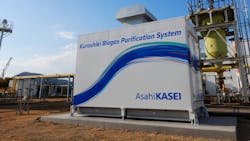Asahi Kasei Demonstrates High-Efficiency Biogas Purification System in Japan
Japanese manufacturer Asahi Kasei has successfully completed a demonstration trial of a biogas purification system that uses advanced zeolite materials to produce high-purity biomethane.
The pilot project, conducted at the Kojima Sewage Treatment Plant in Kurashiki City, achieved biomethane yields above 99.5% with purity exceeding 97% — a milestone in the quest for efficient, scalable bioenergy solutions.
The trial began in February 2025 and marks a key step toward commercial deployment of the technology. Asahi Kasei is now moving into licensing discussions with international partners and aims to bring the system to market by 2027.
The system is based on a pressure vacuum swing adsorption (PVSA) process that uses proprietary zeolites (porous crystalline materials known for their precise gas separation properties) to extract methane from biogas while removing carbon dioxide. High yield and purity have historically been difficult to achieve simultaneously, making this demonstration a potential breakthrough in biomethane production.
Biomethane, a refined form of biogas, is gaining attention as a renewable substitute for natural gas. Because it can be injected into existing gas pipelines or compressed into bio-CNG (compressed natural gas), it offers a low-carbon, infrastructure-compatible energy source. Demand is particularly strong in Europe and India, where governments are promoting biogas as part of their energy transition strategies. In the U.S., biomethane is also being used in transportation and heating sectors as a cleaner alternative to fossil gas.
The demonstration used biogas produced from sewage sludge, highlighting the technology’s potential role in waste-to-energy applications. According to Asahi Kasei, the system ran continuously for one month, confirming both operational stability and performance metrics.
Kazuya Noda, Senior General Manager of the company’s Material Business R&D unit, said that licensing talks are already underway. “After commercial-scale pilot studies, we plan market launch in 2027,” Noda said.
The company, which has long been involved in gas separation and catalyst technologies, views the biomethane system as part of its broader efforts to support the global shift to sustainable energy and reduce methane emissions. More than 150 countries have signed the Global Methane Pledge, a global agreement to cut methane emissions, further increasing demand for solutions like this.
Asahi Kasei’s demonstration aligns with a growing trend toward circular economy models that recover energy from waste while reducing greenhouse gas emissions.
